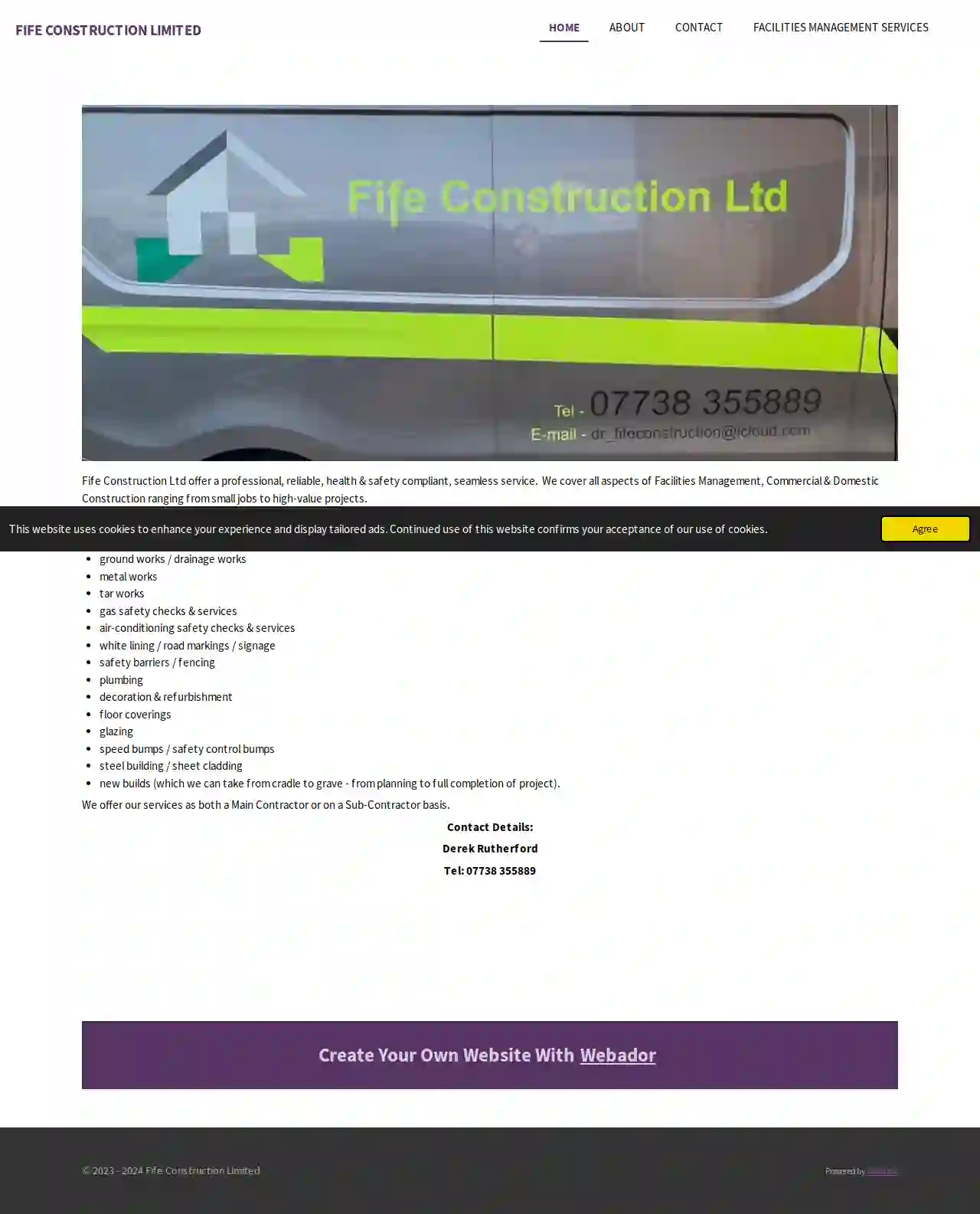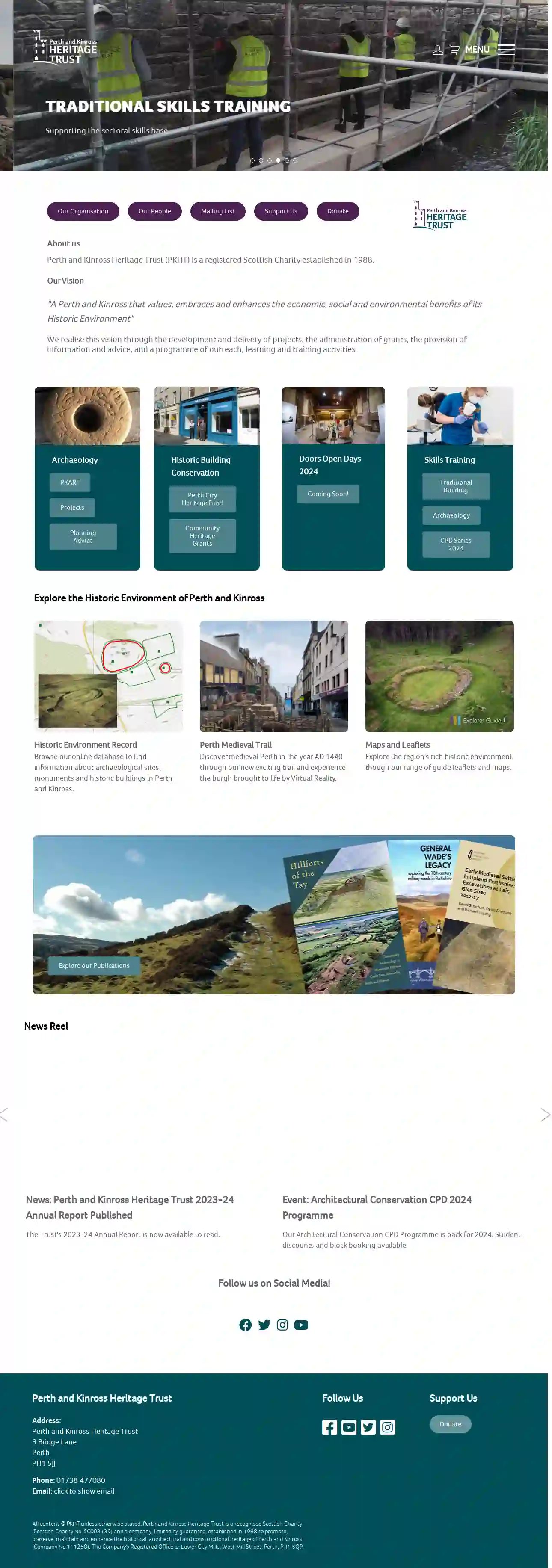Excavation Contractors Monifieth
Top Excavating Contractors in Monifieth
Get up to 3 Excavating Contractors quotes for your project today! Compare profiles, reviews, accreditations, portfolio, etc... and choose the best deal.

Avenue North Limited
Unit 71, 44-46 Morningside Road, Unit 71 44-46 Morningside Road Edinburgh, Edinburgh, EH10 4BF, GBWho we are Avenue North is an Edinburgh based construction company, specializing in new build residential works, refurbishment projects and commercial interiors. We are a team of construction professionals and trades people with the skills, experience and track record of delivering high end quality projects. What we do We manage and deliver new build construction and refurbishment works within residential and commercial sectors for private clients, investors and developers. We have the knowledge and capability to manage complex and technically challenging projects. An appreciation of conservation and preservation enables us to provide a sympathetic and understanding approach when working on listed buildings.
- Services
- Why Us?
- Our Team
- Gallery
Get Quote
Fife Construction Ltd
32 reviewsEdinburgh, GBAbout Fife Construction Limited With over 25 years of experience in the industry, Fife Construction Limited offers top-class workmanship and attention to detail at a price to suit all budgets. We are a professional company that can undertake all aspects of facilities management (which we currently provide to major commercial companies throughout Scotland) and/or commercial or domestic construction work. Our dedicated team can offer you a solution for all your facilities management / building & construction needs. Our highly experienced team will consult you at every stage of the process/project to ensure that your needs are met perfectly (high quality, on-budget & to time-scale). We provide an extremely high-quality, safety-conscious & customer-friendly service at all times! We offer our services on a Main Contractor or Sub-Contractor basis.
- Services
- Why Us?
- Our Team
- Gallery
Get Quote
A G Thomson & Sons
56 reviewsSpott Road, Dunbar, EH42 1RR, GBAbout Us A.G. Thomson & Sons provide a wide range of services to a broad spectrum of customers in the East of Scotland. Established in 1948 by Alexander Gray Thomson, the company is still run by the Thomson family today with an emphasis on competitive rates and excellent service. Based in Dunbar, East Lothian, A.G. Thomson & Sons have a wide range of plant and works machinery available including Road Planers, Paving Machines, Road Sweepers, Asphalt Rollers, Excavators, Tippers, Low Loaders and Tar Hotboxes, all of which are supplied complete with trained personnel, fuel and insurance. Available for hire whenever you require our services. We also specialise in all aspects of drainage and concrete works. We pride ourselves on high standards to meet the customer’s specific requirements and getting the job done on time and within budget. Our team of 15 highly trained and experienced staff have many years of experience between them in their respective fields. Call now for a competitive quote to cover all of your requirements.
- Services
- Why Us?
- Gallery
Get Quote
Beaver Farm
4.318 reviewsEdinburgh, GBWelcome to Beaver Farm Landscaping Company of Richmond, VA With more than 30 years of professional landscaping experience, you can trust Beaver Farm Landscaping with your Richmond, VA area landscape project. We specialize in total lawn and landscape renovation, but can handle any size and type of landscape job including planting, edging, mulching and raised beds. We know that landscaping can become a challenging task over time, and especially if you have a larger property. We promise to provide you with the highest standards of quality and service for all your landscaping needs, whether they be landscape and lawn services, fine grading, drainage systems, hardscapes, tractor mowing, or snow removal! So when quality counts, count on Beaver Farm Landscape! Landscapers That Care About Your Outdoor Space! At Beaver farm, all of our professionals are fully insured and operate using industry leading equipment and machinery. We follow all state building codes and regulations on our projects so that you have nothing to worry about as a homeowner! Need professional landscaping done at your home? We’ve got you covered with our residential landscaping services. Need professional landscaping done at your business? We’ve got you covered with our commercial landscaping projects. Need to hire someone for excavation and grading? The landscaping professionals at Beaver Farm Landscaping have you covered! Your Total Lawn and Landscape Renovation Experts When your Richmond, VA landscape reaches the point where it is too expensive or labor intensive to revive, call Beaver Farm for your landscaping needs. We will assess your property and craft a new landscape design that fits your lifestyle and budget. Learn more about total lawn and landscape renovation
- Services
- Why Us?
- Gallery
Get Quote
SD Clark Planthire & Groundworks
4.36 reviewsQuarrybank Alyth Rd, Rattray, Blairgowrie, PH10 7HQ, GBGroundworks & Plant Hire With SD Clark Planthire & Groundworks in Perthshire PROVIDING PLANTHIRE & GROUNDWORKS IN SCOTLAND FOR OVER 25 YEARS Contact Us Now Operated Plant Hire & Groundwork Contractors In Perthshire & The Whole Of Scotland - A Little About Us Based in Blairgowrie, Perthshire, Scotland, SD Clark Planthire & Groundworks is a family run firm with over 25 years' experience in both the construction and agricultural industry. We provide bespoke groundworks and operated plant hire throughout Scotland. We take pride in delivering work carried out to a professionally high standard, which is highlighted in our testimonials. Being fully insured and ISO accredited gives our clients the reassurance and satisfaction that our work is carried out to the highest of standards. OUR SERVICES - Superior Quality Services Guaranteed Groundwork services Standards guaranteed Concrete supply Testimonials Plant and machinery hire Contact OUR SPECIALISED SERVICES As leading groundworks contractors in Perthshire, our services extend across Scotland. Whether it's fundamental groundworks or intricate projects using advanced machinery, we're dedicated to assisting you comprehensively. Forestry Road Construction Construct durable forestry roads with our expertise, ensuring accessibility to remote areas. Our precision in planning and execution guarantees reliable routes for your forestry operations. Horse Arenas Create the perfect equestrian arena with our specialised construction services. From the foundation to the finishing touches, we ensure a safe and optimal environment for both riders and horses. Demolition Work Trust us for safe and efficient demolition services. Whether it's a small-scale structure or a larger project, our experienced team utilises industry-best practices to ensure precision and safety throughout the process. SATISFIED CLIENTS SPEAK Joe M. New Build Foundations, Drainage, And Concrete Slab - Fantastic Job, Highly Recommend “Sean is the consummate professional; he delivers a superior quality product at a very competitive price, I hope to have Sean back to the build to do the blockwork and driveway.”
- Services
- Why Us?
- Testimonials
- Gallery
Get Quote
Edinburgh Paving solutions
4.9157 reviews19 Newcraighall Road, Edinburgh, EH15 3HH, GBEstablished for over 25 years Having 25 years experience in paving and landscaping we at Edinburgh Paving Solutions pride ourselves on all our services which includes professional paving, driveway and landscaping. We also take care of high-quality paving services including pathways, patio and monoblocking. We take pride in providing the best workmanship at competitive prices. We are Health and Safety at Work Level 1 awardee. We are also a Checkatrade member and a Tobermore approved paving contractor.
- Services
- Why Us?
- Testimonials
- Gallery
Get Quote
Perth & Kinross Heritage Trust
4.58 reviews10 Kinnoull Street, Perth, PH1 5JD, GBPerth and Kinross Heritage Trust Preserving & enhancing the region's historic environment Our Mission The Perth and Kinross Heritage Trust (PKHT) is a registered charity dedicated to preserving and enhancing the historic environment of Perth and Kinross. We achieve this through a variety of projects, including: Providing grants to support heritage projects Carrying out archaeological research and surveys Offering training courses in traditional building skills Raising awareness of the region's heritage through events and publications We believe that our heritage is a valuable asset that should be protected for future generations. We are committed to working with communities to ensure that our heritage is accessible to all. Our History The Perth and Kinross Heritage Trust was founded in 1994. Since then, we have been working hard to preserve and enhance the region's historic environment. We have a long and proud history of working with communities to protect our heritage. We have also been involved in a number of high-profile projects, such as the restoration of the historic buildings in Perth city centre. We are committed to continuing our work to protect and enhance the region's heritage for future generations.
- Services
- Why Us?
- Gallery
Get Quote
Paragon Traffic Management Ltd
Brit House High St East, Scunthorpe, DN15 6UH, GBLeading Traffic Management Across the UK At Paragon Traffic Management, we specialise in providing comprehensive traffic management services to ensure safety and efficiency on the UK's roads with a particular focus on London, Scotland and the midlands. Our team delivers rapid, reliable solutions, tailored to meet the unique needs of construction, events, utilities, and emergency situations. With a commitment to excellence, we leverage advanced technology and industry expertise to keep your projects moving smoothly, ensuring minimal disruption and maximum safety. Safety By Choice, Not By Chance Find out more
- Services
- Why Us?
- Gallery
Get Quote
Alder Archaeology Ltd
32 reviews55 South Methven Street, Perth, PH1 5NX, GBWelcome to Alder Archaeology Alder Archaeology Ltd is a professional archaeological organisation based in Perth, Scotland. We offer a range of services to help with archaeological conditions that arise from development. We can also provide general archaeological advice to developers and individuals prior to and during the planning process.
- Services
- Why Us?
Get Quote
Chamic Industrial Services limited
36 reviews27 Bankhead Drive, Edinburgh, EH11 4DN, GBDEMOLITION AND ASBESTOS REMOVAL CONTRACTOR & BUSINESS PARTNER Based in Edinburgh, Chamic Industrial Services Ltd has been providing demolition and asbestos removal services since 1985. Specialist contractors With a proven track record. Edinburgh based Chamic Industrial Services Limited are specialist Asbestos Removal and Demolition Contractors. We have been operating since 1985 and are committed to providing a quality professional service to our clients. Trusted locally by a wide range of customers, we have conducted many bespoke commercial and domestic contracts. Our clients include many large companies, local authorities, hospital trusts and universities, as well as other public sector customers and domestic clients. We provide specialist asbestos removals and demolition works, including: Asbestos removal, treatment and disposal Large or small scale demolitions and internal down takings Asbestos surveys and consultancy Site refurbishment and clearances Facade retention Industrial cleaning Emergency services are also available Highly trained staff Chamic Industrial Services Ltd has highly trained staff who always perform to the highest standards. We comply with current legislation related to working within the asbestos removal and demolition industries. Chamic have won multiple National Awards as part of the Considerate Constructors Scheme. We are members of the Asbestos Control & Abatement Division (ACAD) and participate in the Site Audit Accreditation Scheme. Our company values Health & Safety - we always ensure that Health & Safety is our highest priority. Environment - we are committed to protecting our environment through a sustainable approach. Honesty & Integrity - we encourage and expect our workforce to always do the right thing. Quality - we strive to achieve the highest standards of workmanship and service. Leadership - we set a good example and expect the same from others.
- Services
- Why Us?
- Gallery
Get Quote
Over 13,059+ Excavation Contractors on our platform
Our excavation providers operate in Monifieth & surroundings!
ExcavationHQ has curated and vetted Top Excavation Companies near Monifieth. Find the most reliable business today.
Frequently Asked Questions About Excavation Contractors
- Determining Soil Suitability: Assessing whether the soil can support the intended structure or load.
- Recommending Foundation Types: Advising on the appropriate foundation design based on soil characteristics.
- Addressing Drainage and Erosion Issues: Providing solutions to manage water runoff and prevent erosion.
- Evaluating Slope Stability: Assessing the risk of landslides or soil movement on slopes.
- Building on challenging soil types (expansive clay, loose sand, etc.)
- Constructing large or complex structures
- Excavating near slopes or retaining walls
- Addressing drainage or erosion concerns
- Mechanical Excavation: Utilizing heavy equipment like excavators, backhoes, bulldozers, and loaders, suitable for most projects.
- Hand Excavation: Using hand tools (shovels, picks) for smaller excavations or delicate work near utilities.
- Blasting: Employing explosives to break up rock or hard materials, typically for large-scale projects.
- Hydro Excavation: Using high-pressure water jets to loosen and remove soil, often used for locating utilities or delicate excavation.
- Vacuum Excavation: Employing a vacuum system to suck up excavated material, suitable for safe excavation near utilities or in confined spaces.
- Topsoil Removal: Stripping the fertile topsoil layer from a site, often preserving it for landscaping.
- Trench Excavation: Digging long, narrow trenches for utilities (pipes, cables) or foundations.
- Basement Excavation: Removing earth to create a space for a basement beneath a structure.
- Pool Excavation: Digging a precise hole for installing a swimming pool.
- Roadway Excavation: Removing earth and preparing the ground for road construction.
- Demolition Excavation: Clearing debris and preparing the site after demolition.
- Channel Excavation: Creating channels for drainage or irrigation.
- Basement Size: The larger the basement, the more excavation is required, increasing the cost.
- Soil Type: Excavating rocky or dense clay soil is generally more expensive than loose soil.
- Accessibility: Difficult-to-access sites might require specialized equipment or more labor, driving up costs.
- Foundation Type: The chosen foundation type (full basement, crawl space, slab) affects excavation needs.
- Underpinning: If underpinning (strengthening existing foundations) is necessary, it significantly increases costs.
- Disposal Fees: Hauling excavated soil to disposal sites adds to the overall expense.
What is a soil engineer, and do I need one?
What are the different methods of excavation?
What are the different types of excavation?
How much does it cost to excavate a basement?
What is a soil engineer, and do I need one?
- Determining Soil Suitability: Assessing whether the soil can support the intended structure or load.
- Recommending Foundation Types: Advising on the appropriate foundation design based on soil characteristics.
- Addressing Drainage and Erosion Issues: Providing solutions to manage water runoff and prevent erosion.
- Evaluating Slope Stability: Assessing the risk of landslides or soil movement on slopes.
- Building on challenging soil types (expansive clay, loose sand, etc.)
- Constructing large or complex structures
- Excavating near slopes or retaining walls
- Addressing drainage or erosion concerns
What are the different methods of excavation?
- Mechanical Excavation: Utilizing heavy equipment like excavators, backhoes, bulldozers, and loaders, suitable for most projects.
- Hand Excavation: Using hand tools (shovels, picks) for smaller excavations or delicate work near utilities.
- Blasting: Employing explosives to break up rock or hard materials, typically for large-scale projects.
- Hydro Excavation: Using high-pressure water jets to loosen and remove soil, often used for locating utilities or delicate excavation.
- Vacuum Excavation: Employing a vacuum system to suck up excavated material, suitable for safe excavation near utilities or in confined spaces.
What are the different types of excavation?
- Topsoil Removal: Stripping the fertile topsoil layer from a site, often preserving it for landscaping.
- Trench Excavation: Digging long, narrow trenches for utilities (pipes, cables) or foundations.
- Basement Excavation: Removing earth to create a space for a basement beneath a structure.
- Pool Excavation: Digging a precise hole for installing a swimming pool.
- Roadway Excavation: Removing earth and preparing the ground for road construction.
- Demolition Excavation: Clearing debris and preparing the site after demolition.
- Channel Excavation: Creating channels for drainage or irrigation.
How much does it cost to excavate a basement?
- Basement Size: The larger the basement, the more excavation is required, increasing the cost.
- Soil Type: Excavating rocky or dense clay soil is generally more expensive than loose soil.
- Accessibility: Difficult-to-access sites might require specialized equipment or more labor, driving up costs.
- Foundation Type: The chosen foundation type (full basement, crawl space, slab) affects excavation needs.
- Underpinning: If underpinning (strengthening existing foundations) is necessary, it significantly increases costs.
- Disposal Fees: Hauling excavated soil to disposal sites adds to the overall expense.